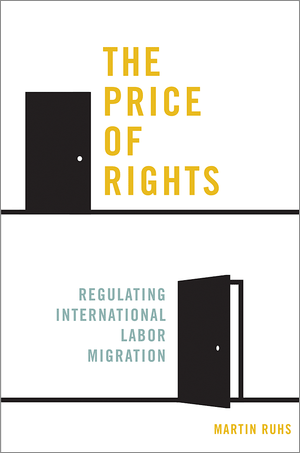 Many low-income countries and development organizations are calling for greater liberalization of labor immigration policies in high-income countries. At the same time, human rights organizations and migrant rights advocates demand more equal rights for migrant workers. “The Price of Rights“, a new book by Oxford Economist and IZA Research Fellow Martin Ruhs, shows why you cannot always have both.
Many low-income countries and development organizations are calling for greater liberalization of labor immigration policies in high-income countries. At the same time, human rights organizations and migrant rights advocates demand more equal rights for migrant workers. “The Price of Rights“, a new book by Oxford Economist and IZA Research Fellow Martin Ruhs, shows why you cannot always have both.
The author analyzes the trade-offs between admitting migrants and granting them rights. The book examines labor immigration policies in over 45 high-income countries, as well as policy drivers in major migrant-receiving and migrant-sending states. It finds that greater equality of rights for new migrant workers tends to be associated with more restrictive admission policies, especially for admitting lower-skilled workers from poorer countries. The tension between “access and rights” applies to a few specific rights that are perceived to create net-costs for the receiving countries including especially the right of lower-skilled migrants to access certain welfare services and benefits.
Most low-income countries around the world are acutely aware of the trade-off between access to labor markets in high-income countries and some migrant rights. Few migrant-sending countries are willing to insist on full and equal rights for fear of reduced access to the labor markets of higher-income countries. As discussed in The Price of Rights, some migrant-sending countries have explicitly rejected equality of rights for their nationals working abroad on the grounds that it constitutes a restrictive labor immigration policy measure.
How to respond to the trade-off between openness and rights is an inherently normative question with no one right answer. Martin Ruhs argues that there is a strong case for advocating the liberalization of international labor migration, especially of lower-skilled workers, through temporary migration programs that protect a universal set of core rights and account for the interests of nation-states by restricting a few specific rights that create net costs for receiving countries, and are therefore obstacles to more open admission policies.
The book suggests that we should start discussing the creation of a list of universal ‘core rights’ for migrant workers that would include fewer rights than the 1990 UN Convention of the Rights on Migrant workers with a higher chance of acceptance by a greater number of countries – thus increasing overall protection for migrant workers including in countries that admit large numbers of migrants.